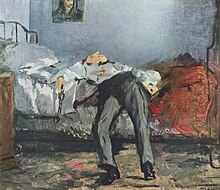Portal:Suicide
Appearance
Suicide (Latin suicidium, from sui caedere, "to kill oneself") is the act of a human being intentionally causing his or her own death. Suicide is often committed out of despair or attributed to some underlying mental disorder. Financial difficulties, troubles with interpersonal relationships and other undesirable situations play a significant role."Suicide," in Wikipedia, the Free Encyclopedia

Demographics of suicide
[edit]- Suicide in Large Cities, as it appeared in the November 1875 Popular Science Monthly
- Catholicism, Protestantism, and Suicide, as it appeared in the December 1881 Popular Science Monthly
- Religious Suicides, as it appeared in the March 1900 Popular Science Monthly
- Suicide: An Essay on Comparative Moral Statistics, by Henry Morselli
Philosophy of Suicide
[edit]- On Suicide, by Arthur Schopenhauer, translated by Thomas Bailey Saunders
- A Consideration of Suicide, by J. H. Hopkins as it appeared in the April 1880 Popular Science Monthly
- Suicide a Sin, 1895 by Robert Ingersoll as it appeared in the New York Journal
- New York Herald/1897/Interview on Suicide, 1897 by Robert Ingersoll as it appeared in the New York Herald
- Tolstoy letter on Suicide, 1898 letter by Leo Tolstoy
Specific suicides
[edit]- Miss Chao's Suicide, 1919 by Mao Zedong
Verse
[edit]- The Suicide's Argument, by Samuel Taylor Coleridge
- Suicide in the Trenches, 1918 by Siegfried Sassoon
- A Ballad of Suicide, by Gilbert Keith Chesterton
- The Tempter, 1937 by Robert Ervin Howard
References works
[edit]- "Suicide," in Domestic Encyclopædia, by A. F. M. Willich, London: (1802)
- "Felo de se," in The American Cyclopædia (1879)
- "Suicide," in The New International Encyclopædia, New York: Dodd, Mead and Co. (1905)
- "Suicide," in Encyclopædia Britannica (11th ed., 1911)
- "Suicide," in Catholic Encyclopedia, (ed.) by Charles G. Herbermann and others, New York: The Encyclopaedia Press (1913)
- "Suicide," in Collier's New Encyclopedia, New York: P. F. Collier & Son Co. (1921)
